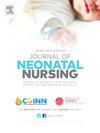Being a parent in neonatal care environments: A survey of the acceptability of sound and song for parents with seriously unwell infants on UK neonatal units
Q2 Nursing
引用次数: 0
Abstract
Background
Having a baby admitted to a Neonatal Unit (NNU) significantly impacts parental mental health and establishment of parental identity. Evidence of positive outcomes from music therapy is growing. However, its accessibility and acceptability on NNUs is rarely considered.
Aim
To explore the a) development and expression of parental and cultural identity on NNUs b) acceptability of music therapy to the neonatal parent population.
Methods
A collaboratively designed survey focused on a) music and cultural identity; b) NNU experience; and c) views on sharing music on the NNU. Analysis was undertaken using Sekhon's framework of acceptability.
Findings
56 responses were received. Establishing parental identity and expressing cultural identity were challenging. Respondents thought music might help support parental and baby wellbeing. The emotional content of music and interruption to valued time were concerns.
Conclusion
Urgent medical care delays establishment of parental identity. Music therapy provision may develop parental self-efficacy. Intervention co-design could increase accessibility and acceptability.
在新生儿护理环境中成为父母:英国新生儿单位对患有严重不适婴儿的父母的声音和歌曲的可接受性的调查
新生儿住院对父母心理健康和父母身份认同的建立有显著影响。音乐疗法产生积极效果的证据越来越多。然而,其可及性和可接受性却很少被考虑。目的探讨新生儿父母认同和文化认同的发展和表达;新生儿父母群体对音乐治疗的接受程度。方法:合作设计的调查侧重于a)音乐和文化认同;b) NNU经验;以及c)关于在NNU分享音乐的意见。使用Sekhon的可接受性框架进行了分析。共收到56份答复。建立父母身份和表达文化身份是一个挑战。受访者认为音乐可能有助于父母和婴儿的健康。音乐的情感内容和对宝贵时间的干扰是令人担忧的。结论紧急医疗服务延迟了父母身份的建立。音乐治疗的提供可能会提高父母的自我效能。干预协同设计可提高可及性和可接受性。
本文章由计算机程序翻译,如有差异,请以英文原文为准。
求助全文
约1分钟内获得全文
求助全文
来源期刊

Journal of Neonatal Nursing
Nursing-Pediatrics
CiteScore
2.00
自引率
0.00%
发文量
143
期刊介绍:
Aims & Scope: This is the practical, bimonthly, research-based journal for all professionals concerned with the care of neonates and their families, both in hospital and the community. It aims to support the development of the essential practice, management, education and health promotion skills required by these professionals. The JNN will provide a forum for the exchange of ideas and information between the range of professionals working in this field; promote cooperation between these professionals; facilitate partnership care with families; provide information and informed opinion; promote innovation and change in the care of neonates and their families; and provide an education resource for this important rapidly developing field.
 求助内容:
求助内容: 应助结果提醒方式:
应助结果提醒方式:


